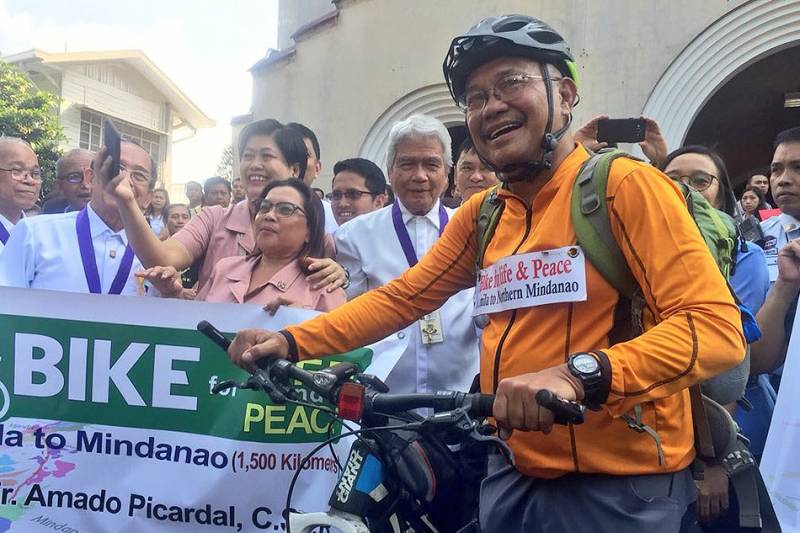Davao mourns Fr Picardal, the ‘cycling theologian’ courageous voice for peace
He died of a heart attack at the age of 69. Since the years when Duterte was mayor of the capital of Mindanao he had fought against his death squads engaged in the ‘war on drugs’. A Redemptorist missionary, he made a great contribution to the grassroots ecclesial communities.
Manila (AsiaNews) - The Church and society in the Philippines are mourning the death of Fr Amado Picardal, a Redemptorist priest, an important voice in the peace and justice movements in Mindanao, who in recent years had strongly criticised former President Rodrigo Duterte for his extrajudicial executions in the war on drugs. Fr Picardal, passed away on 29 May at the age of 69 from a heart attack.
‘Fr Picardal was a brilliant and courageous missionary,’ the provincial superior of the Redemptorists, Fr Edilberto Cepe, remembers him. ‘He was a passionate advocate for peace and social justice and a theologian who touched and transformed the lives of many. May the light and joy he left to this world continue to radiate through us, making us beacons of truth and social transformation’.
Fr. Picardal was born in Iligan City in 1954. Already in the early 1970s, as a philosophy student at the University of San Carlos in Cebu, he was involved in student activism that - under Ferdinand Marcos' martial law - led him to prison for seven months where he was also tortured.
After completing his university studies, he spent six months among the poor in a Cebu slum, where he received training as a community organiser. He entered the Redemptorists and was ordained a priest in 1981. In his ministry, he helped to form and strengthen grassroots ecclesial communities in various parishes and dioceses in Mindanao, the southern Philippine region plagued by deep conflicts that claimed thousands of lives.
In the mission of San Fernando in Bukidnon in the late 1980s, he helped to organise and mobilise communities against logging companies, obtaining a stop to these exploitative activities from the government.
After deepening his theological studies in Berkeley and at the Pontifical Gregorian University, he was professor and dean of academic studies at St Alphonsus Theologate, the Redemptorist theological school in Davao, from May 1995 to March 2011.
Alongside teaching, he has always continued his pastoral activities. A face of Pax Christi in the Philippines, he was heavily involved in Christian-Muslim dialogue and peace advocacy and was a member of the leadership council of the Coalition Against Summary Execution, where he monitored and spoke out against the death squads in Davao, which many believed were inspired and supported by then-Mayor Rodrigo Duterte.
Many knew him as the cycling priest of the Philippines: in 2000, he cycled across the country from Davao to Ilocos Norte for peace, covering 2,083 kilometres. It was only the first of many such initiatives: every year, he organised a community bicycle ride in Davao during the Mindanao Peace Week. In the summer of 2006, he cycled for life and peace around Mindanao for three weeks, accompanied part of the way by some priests and a bishop.
And again in 2008, he completed an even larger tour of the Philippines by bicycle, cycling over 5,000 kilometres in 56 days. He wrote poetry, but he also loved music: he composed some songs for the liturgy and for evangelisation seminars. He had climbed Mount Apo seven times. He also went scuba diving from time to time.
He wanted to propose a theology from below, enculturated and contextual, not only discursive but also narrative and poetic. From June 2011 to December 2017, he had worked full-time as Executive Secretary of the Bishops‘ Committee on Grassroots Ecclesial Communities (BEC) of the Catholic Bishops’ Conference of the Philippines (CBCP). He will be remembered for his contribution to society as a peacemaker, social activist and missionary.







.png)










